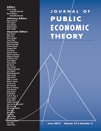
Journal of Public Economic Theory
Scope & Guideline
Pioneering Research in Fiscal and Welfare Economics
Introduction
Aims and Scopes
- Public Goods and Externalities:
The journal frequently investigates the provision and financing of public goods, addressing externalities that arise from individual actions that affect others, and exploring optimal policies to mitigate these effects. - Taxation and Redistribution:
Research in this area delves into the efficiency and equity implications of various taxation strategies, including income, corporate, and environmental taxes, as well as the effects of redistributive policies on social welfare. - Political Economy and Governance:
The journal covers the interplay between economic theory and political processes, examining how institutional frameworks and political dynamics influence economic policies and outcomes. - Market Structures and Competition:
There is a consistent focus on analyzing market behaviors, including monopolistic and oligopolistic structures, competition policies, and their implications for welfare and economic efficiency. - Behavioral Economics and Decision-Making:
Research often incorporates insights from behavioral economics, studying how psychological factors and social influences affect economic decisions, particularly in public policy contexts.
Trending and Emerging
- Climate Economics and Environmental Policy:
Recent publications have increasingly focused on the intersection of economics and environmental concerns, including sustainable development, climate change policies, and the economic implications of environmental regulations. - Health Economics and Pandemic Responses:
In light of recent global health crises, there is a growing emphasis on health economics, exploring optimal responses to pandemics, vaccine distribution strategies, and the economic impacts of health policies. - Digital Economy and E-Commerce:
Research is increasingly addressing the complexities of the digital economy, including taxation of digital services, the implications of e-commerce for traditional public finance, and regulatory challenges in the digital marketplace. - Social Equity and Inclusion:
There is a rising focus on issues of social equity, exploring how public policies can address inequalities, promote inclusiveness, and enhance welfare across diverse populations. - Behavioral Insights in Policy Design:
The integration of behavioral insights into public policy design is gaining traction, focusing on how understanding human behavior can improve the effectiveness of economic policies and interventions.
Declining or Waning
- Traditional Welfare Economics:
There appears to be a waning interest in classical welfare economics frameworks that do not account for behavioral factors or complexities of modern economies, as newer models incorporating behavioral insights gain traction. - Static Economic Models:
The journal has seen a decrease in publications focusing on static models of economic analysis, with a shift towards dynamic models that better capture the complexities of economic interactions over time. - Purely Theoretical Explorations:
There is a trend away from purely theoretical explorations without empirical or practical applications, as the journal increasingly favors studies that bridge theory with real-world policy implications. - Conventional Public Finance:
Research specifically focused on traditional public finance theories seems to be declining, as the field moves towards integrating interdisciplinary approaches that consider social, political, and environmental factors. - Simple Tax Policy Analyses:
There is less emphasis on straightforward analyses of tax policies without considering broader implications, such as behavioral responses and equity considerations, reflecting a shift towards more comprehensive evaluations.
Similar Journals

PUBLIC CHOICE
Advancing Interdisciplinary Insights in Public ChoiceWelcome to Public Choice, a prestigious academic journal published by Springer that has been paving the way for interdisciplinary research since 1966. Based in the Netherlands, Public Choice delves into the realms of economics, sociology, and political science, addressing the complexities of collective decision-making and resource allocation. With an impressive impact factor and a Q1 ranking in Sociology and Political Science, along with a Q2 ranking in Economics and Econometrics, this journal serves as a vital platform for researchers, professionals, and students alike, promoting scholarly discourse and groundbreaking insights. Despite not being an Open Access journal, Public Choice remains accessible through various academic databases, enriching the academic community's understanding of public decision processes and their implications. Join us in exploring the dynamics of public behavior and collective action as we continue to contribute to the field through 2024 and beyond.
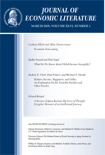
JOURNAL OF ECONOMIC LITERATURE
Advancing economic knowledge through critical surveys.JOURNAL OF ECONOMIC LITERATURE, published by the American Economic Association, stands as a premier academic journal in the field of economics, with a notable Q1 classification in Economics and Econometrics for 2023. Operating from its base in Nashville, TN, this journal has established itself as an indispensable resource for economic researchers and practitioners alike, boasting an impressive Scopus ranking of 10 out of 716—placing it in the top 2% of its category. The journal's commitment to providing comprehensive critical surveys of the literature enhances the understanding of various economic topics, making it a vital tool for researchers seeking to deepen their knowledge or explore new areas of inquiry. Although it operates on a subscription basis, the journal’s high impact on the economics community underlines its importance in advancing the field. With coverage spanning from the 1980s to the present, JOURNAL OF ECONOMIC LITERATURE continues to encourage rigorous scholarship and bridge theoretical and empirical research, enabling informed discourse among economists globally.
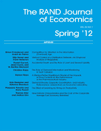
RAND JOURNAL OF ECONOMICS
Bridging Theory and Application in EconomicsRAND JOURNAL OF ECONOMICS, published by Wiley, is a prestigious peer-reviewed journal that has been a cornerstone in the field of economics since its inception in 1984. With a focus on empirical and theoretical research, it aims to bridge the gap between economic theory and real-world application, providing insights that are both rigorous and relevant. The journal holds an impressive Q1 ranking in Economics and Econometrics, reflecting its significant impact and influence in the field, evidenced by its Scopus rank of #199 out of 716 in related categories. Although it does not offer open access, the journal remains accessible to a broad audience through institutional subscriptions. Researchers, professionals, and students will find RAND JOURNAL OF ECONOMICS an invaluable resource for cutting-edge economic analyses and a vital platform for scholarly dialogue about contemporary economic issues.
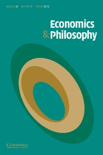
ECONOMICS AND PHILOSOPHY
Exploring the Intersection of Value and Virtue.ECONOMICS AND PHILOSOPHY is a distinguished journal published by Cambridge University Press, dedicated to the interdisciplinary study that bridges the gap between economic theories and philosophical discourse. With an ISSN of 0266-2671 and an E-ISSN of 1474-0028, this journal has been a critical resource for scholars since its inception in 1985, evolving continually to encompass contemporary issues and methodologies through to 2024. The journal holds a Q3 ranking in Economics and Econometrics and an impressive Q1 ranking in Philosophy for 2023, as per its category quartiles. Additionally, it ranks 123 out of 806 in the Arts and Humanities – Philosophy category, reflecting its high impact within the philosophical community. While it does not currently offer open access, the journal remains an essential platform for researchers, professionals, and students who seek to delve into the philosophical implications of economic thought and practice. In an era where economic decisions profoundly influence global society, ECONOMICS AND PHILOSOPHY plays a vital role in fostering critical dialogue and advancing scholarly insight.

REVUE ECONOMIQUE
Pioneering Perspectives in the World of EconomicsREVUE ECONOMIQUE, published by PRESSES FOND NAT SCI POLIT in France, is a distinguished academic journal with an ISSN of 0035-2764 and an E-ISSN of 1950-6694. Established in 1974, the journal has evolved significantly over the years, focusing on a diverse range of topics within the field of economics, econometrics, and finance. With its commitment to presenting in-depth research and innovative perspectives, REVUE ECONOMIQUE serves as a vital resource for scholars, professionals, and students seeking to enhance their understanding of economic theories and practices. Although it is currently categorized in the Q4 quartile, ranking 241 out of 288 in the field, the journal aims to foster new dialogues and disseminate valuable insights that contribute to the economic discourse. The journal is not available as open access, but its rich repository of articles continues to attract readers interested in the complexities of economic dynamics. For more information, you can refer to their address at 27 RUE SAINT-GUILLAUME, 75341 PARIS 07, FRANCE.

Public Finance Quarterly-Hungary
Transforming Perspectives on Fiscal PolicyPublic Finance Quarterly-Hungary is a premier academic journal published by Corvinus University of Budapest, dedicated to advancing the understanding of public finance and its intersection with broader economic and administrative frameworks. Operating under the ISSN 0031-496X and E-ISSN 2064-8278, this journal provides a vital platform for rigorous research and scholarly discourse in the fields of finance and public administration. With a notable impact factor reflected in its 2023 Scopus category rankings, which position it in the third quartile for both finance and public administration, the journal plays a critical role in shaping academic and policy debates in Hungary and beyond. The scope encompasses a wide range of topics related to public financial management, fiscal policy, and economic governance, appealing to researchers, practitioners, and students interested in both theoretical and empirical studies. As Hungary's key source of knowledge in public finance, Public Finance Quarterly underscores the significance of collaborative research efforts in addressing contemporary economic challenges.
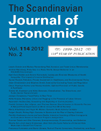
SCANDINAVIAN JOURNAL OF ECONOMICS
Exploring the Frontiers of EconometricsSCANDINAVIAN JOURNAL OF ECONOMICS (ISSN: 0347-0520, E-ISSN: 1467-9442), published by Wiley, stands as a pivotal platform for disseminating research in the fields of economics and econometrics. With an impressive Q1 ranking in both disciplines, this journal plays a critical role in advancing theoretical and applied economic research, catering to an international audience of scholars, practitioners, and students. Its coverage from 1977 to 2024 demonstrates a robust commitment to publishing high-quality research that influences both policy-making and academic inquiry. Although it operates on a traditional subscription model, the journal remains accessible to a broad readership, which is essential for fostering knowledge sharing within the economics community. As such, the SCANDINAVIAN JOURNAL OF ECONOMICS is an essential resource for those seeking to explore the latest developments and methodologies in economic research, helping to bridge practical insights with academic rigor.
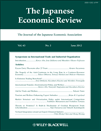
JAPANESE ECONOMIC REVIEW
Advancing insights into Japan's economic landscape.Japanese Economic Review, published by Springer Heidelberg, is a renowned academic journal that aims to advance the understanding of economic processes within the context of Japan and the Asia-Pacific region. With an ISSN of 1352-4739 and E-ISSN of 1468-5876, this journal features high-quality research articles that span a broad range of topics in economics and econometrics. Ranked in the Q2 category for Economics and Econometrics as of 2023, it holds a Scopus rank of #332 out of 716, placing it in the 53rd percentile among its peers. Although not Open Access, the journal invites contributions that provide insights and empirical analyses beneficial to both academics and practitioners. Emphasizing a deep understanding of economic dynamics, the Japanese Economic Review is essential reading for anyone interested in the implications of economic policies and trends, making it a significant platform for scholarly dialogue and research dissemination.

American Economic Journal-Economic Policy
Transforming Economic Research into Actionable PoliciesAmerican Economic Journal - Economic Policy, published by the American Economic Association, stands at the forefront of economic research, focusing on significant policy implications and evidence-based evaluations. With an ISSN of 1945-7731 and an E-ISSN of 1945-774X, this esteemed journal has maintained its influence and credibility in the field since its inception in 2009. Ranked in the Q1 category for Economics, Econometrics and Finance and ranking #7 out of 288 in Scopus, it boasts a remarkable 97th percentile ranking, making it a premier source for cutting-edge research and policy discussion. The journal's rigorous peer-reviewed articles aim to bridge the gap between academic research and real-world economic policy, serving as an essential resource for researchers, professionals, and students who seek to engage with and contribute to the evolving landscape of economic policy. With open access options not currently available, readers are encouraged to subscribe or access articles through academic institutions for comprehensive insights into the economic challenges and innovations shaping our world.
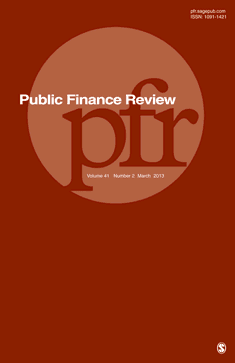
PUBLIC FINANCE REVIEW
Exploring the Dynamics of Public FinancePUBLIC FINANCE REVIEW, published by SAGE Publications Inc, is a prominent journal that serves researchers, professionals, and students in the fields of economics, finance, and public administration. With an ISSN of 1091-1421 and an E-ISSN of 1552-7530, this journal has been a vital resource since its inception in 1973, providing valuable insights and analyses on public finance issues. Although it does not currently offer open access options, the journal's rigorous peer-review process ensures high-quality content that addresses contemporary challenges in public policy and economics. Ranked in the Q2 category for Public Administration and Q3 in Economics and Finance according to 2023 metrics, it holds respectable positions in Scopus rankings, reflecting its impact on the evolving discourse surrounding financial governance. Researchers and policymakers alike can benefit from the journal's detailed studies and strategic evaluations that contribute to informed decision-making in public finance.